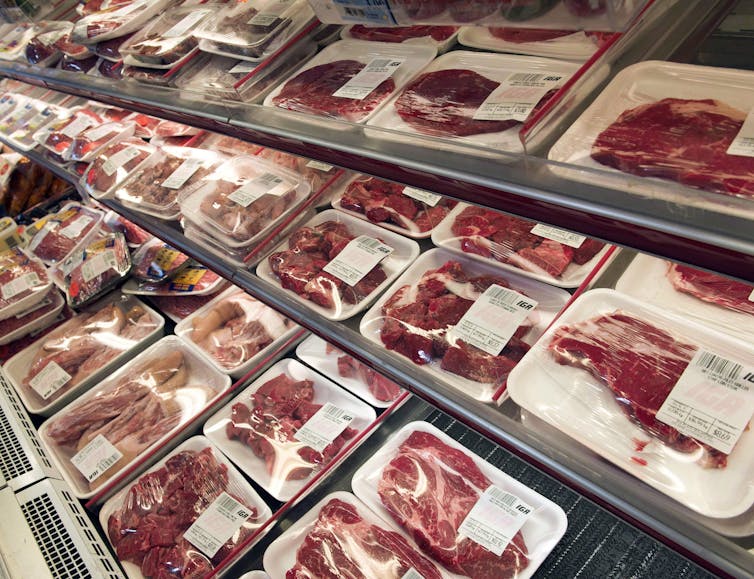This article was originally published on¬Ý, which features includes relevant and informed articles, written by researchers and academics in their areas of expertise and edited by experienced journalists.
is a professor in food distribution and policy at
The idea of having to pay a sin tax for environmentally detrimental foods is gaining more support. For some, eating meat is a sin, and therefore meat products should be taxed like alcohol and tobacco.
argues that a tax on meat is inevitable.
The meat industry, particularly beef producers, has been facing relentless criticism over the last decade. Very rarely have we seen reports encouraging consumers to eat more meat.
For one thing, science-based findings linking climate change and meat have been accumulating. The United Nations Food and Agriculture Organization of the world’s greenhouse gas emissions. Other surveys have suggested the sector may represent up to 18 per cent.
Greenhouse gas emissions produced by the livestock industry will only increase as the middle class in both India and China expand, and, as such,
And then there’s health.
In 2015, the World Health Organization The report indicated that eating processed meat products increases the risk of developing cancer.
, including , the U.S., Brazil and Australia, ridiculed the report because processed meats were added to the same category as asbestos.
Meat-eating discouraged in some countries
But several other governments, and some European countries, have actively discouraged their citizens from consuming an unreasonable amount of meat. That’s not a signal the meat industry needs.
The other major headwind the industry faces is related to the ethical treatment of animals. Some believe livestock production is unethical and that the industrial production of meat , period.
The ethics narrative around meat has been gaining traction over the last decade or so.
Now, if you think the FAIRR initiative is some minor, under-resourced group desperately trying to seek attention, think again. It includes a portfolio of 57 investors with more than US$2.3 trillion under management.
This alliance clearly wants to influence the plant-based protein agenda, and has had its fair share of success in doing so. Already, agri-food giants like Tyson Foods and Cargill
Demand-focused companies are seeing the writing on the wall. Many consumers are , although in cattle country, a large number remain in deep denial and blame interest groups for fear-mongering.
Canadians still love their meat
Statistics show that demand for meat in Canada is still stubbornly robust. The average Canadian typically consumes in one year, which is just slightly lower than the amount from five years ago.
This year, beef consumption in our country reached 25.4 kilograms per capita, and some expect demand for the product to increase to 25.5 kilograms next year. Surprising, perhaps, but beef prices have come down, making the product more attractive for the consumer on a budget.
Some should be noted, though. Alberta is by far the largest consumer of beef; the average adult Albertan male will eat 83 grams a day. That’s 53 per cent more than the average in Newfoundland, and 18 per cent more than in neighbouring British Columbia. Affordability and lifestyle are probable reasons for such a difference.
Canadian consumers have stayed on the side of our livestock industry, but numbers are showing signs of a change in consumer habits.
Demand for pork is dropping 13 per cent from its 2015 level. Demand for chicken, one of the cheapest types of animal protein out there, plateaued in 2016 and has since softened.
Although beef could experience a rebound in 2018, expected increases aren’t spectacular given how low retail prices are these days. Canadians are not giving up on meats, but they are willing to spend more time away from the meat counter. Animal protein still has market currency, but plant-based alternatives to meat are increasingly attractive.
But little can be accomplished by taxing meat. Taxing food in general — any food product — is morally questionable. A retail tax on food is regressive and can potentially penalize the underprivileged who need affordable sources of protein.

Meat the new tobacco?
Some have argued that . This sensationalist parallel is unwise, since tobacco is not essential to life and food is.
The implementation of such a tax would also be challenging.
If federal or provincial governments were to tax meat, funds would likely be used to support other relevant public programs. But as with any tax, transparency on how funds are dispersed within the massive, bureaucratic governmental machinery is weak.
What’s more, many small businesses around the country have offered high-quality meat products to local markets. Many of them are family businesses. Taxing sausages and steaks would compromise the viability of many stores valued by communities across the country.
Meat has played a significant part in consumers’ lives in the Western world for centuries. Penalizing consumers for continuing a culinary tradition is unfair.
Taxing a food product that’s been entrenched in our culture for so long is idealistically silly. We should let the market evolve and allow consumers to make their own choices.
![]() That said, the livestock industry must pore over market data and start listening to consumers in order to better appreciate their concerns. Given that they are , livestock producers are ideally positioned to renew their social contract with the public.
That said, the livestock industry must pore over market data and start listening to consumers in order to better appreciate their concerns. Given that they are , livestock producers are ideally positioned to renew their social contract with the public.
Read the on The Conversation.
ª∆…´÷±≤• is a founding partner of The Conversation Canada, a new-to-Canada online media outlet providing independent, high-quality explanatory journalism. Originally established in Australia in 2011, it has had more than 85 commissioning editors and 30,000-plus academics register as contributors. A full list of articles written by ª∆…´÷±≤• academics can be found on¬Ý.

